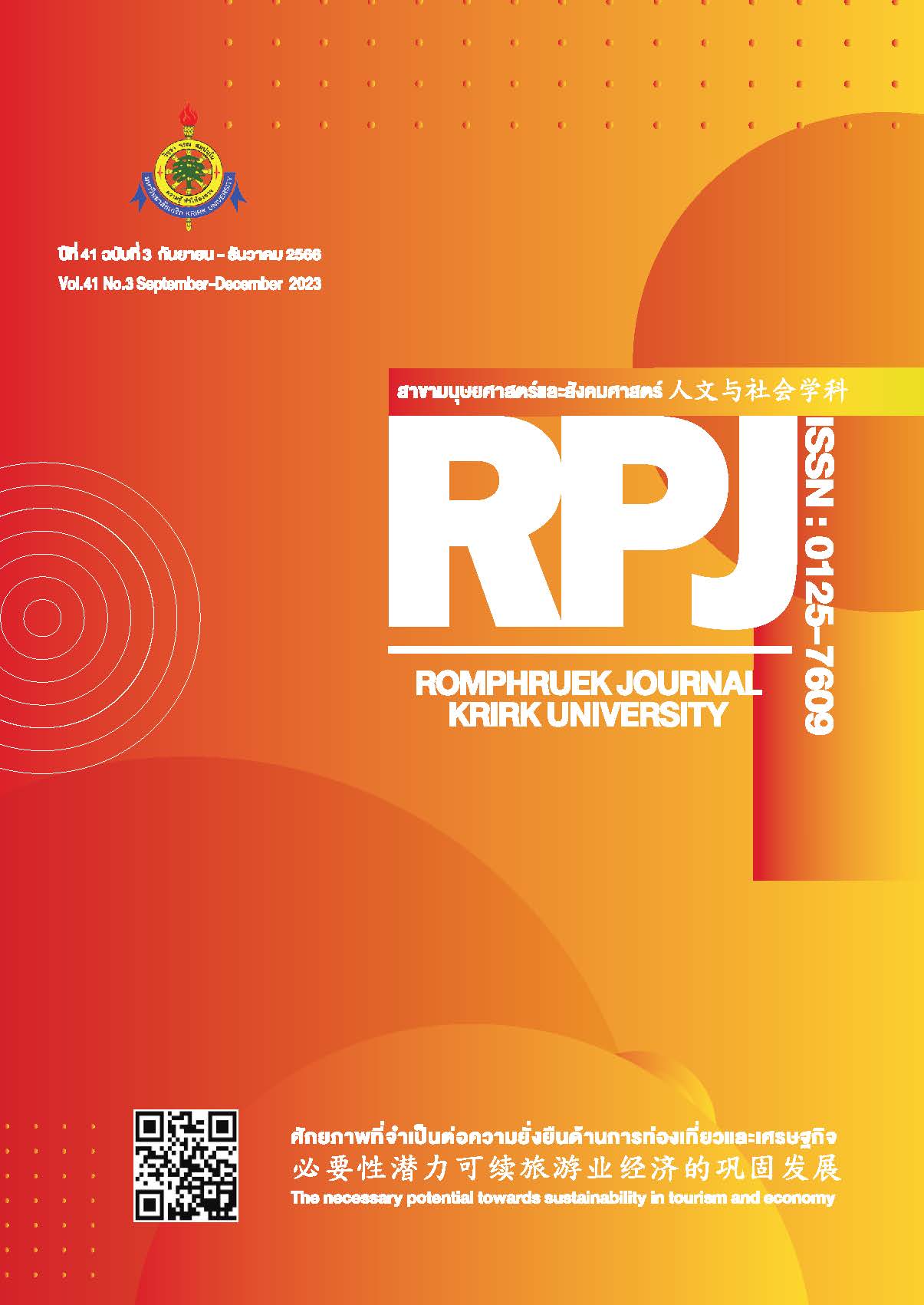Development of Learning Management in the 21st Century Using the Professional Learning Community (PLC)
Main Article Content
Abstract
The development of learning management in the 21st century using the Professional Learning Community (PLC) is crucial as it will serve as a guideline for formulation of educational policies and the learning process of teachers to be consistent with Thai education in the 21st century. This means that for students to improve their accomplishment and competency growth, their ability to learn must be developed through collaborative learning and teamwork. Key attributes according to the goals of the educational management development using a community of professional learning (Professional Learning Community: PLC) consists of four components: 1) shared leadership, 2) work participation, 3) shared values and vision and 4) exchanging knowledge, and focus on learning management in 5 areas: 1) educational curriculum development 2) preparation of a learning management plan 3) student-centered learning management 4) the use of media and information technology, and 5) learning resources that facilitate learning and various methods of measurement and evaluation.
Article Details

This work is licensed under a Creative Commons Attribution-NonCommercial-NoDerivatives 4.0 International License.
Every article published in the Romphruek Journal of the Humanities and Social Sciences is the opinion and point of view of the authors. Thery're not the viewpoint of Krirk University or the editored department. Any part or all of the articles for pablication must be clearly cited.
References
กฤษธรา ยองใย. (2561, 30 พฤศจิกายน). ผู้บริหารสถานศึกษาในศตวรรษที่ 21. การประชุมวิชาการและนำเสนอผลงาน. การวิจัยระดับชาติ ครั้งที่ 2. http://journalgrad.ssru.ac.th.
กระทรวงศึกษาธิการ. (2554). แผนแม่บทเทคโนโลยีสารสนเทศและการสื่อสารเพื่อการศึกษากระทรวงศึกษาธิการ พ.ศ. 2554-2556. สำนักปลัดกระทรวงศึกษาธิการ.
กาญจนา คุณารักษ์. (2558). พื้นฐานการพัฒนาหลักสูตร (พิมพ์ครั้งที่2). โรงพิมพ์มหาวิทยาลัยศิลปากร.
แก้วเวียง นำนาผล. (2554). การจัดการความรู้ในสถานศึกษา: แนวคิดสู่การปฏิบัติ. โรงพิมพ์ตักสิลาการพิมพ์.
เจนจิรา ยะตั๋น. (2565, 3 มิถุนายน). การบริหารจัดการเรียนรู้. บ้านคุณครูเจนจิรา.
https://sites.google.com/a/crru.ac.th/ban-khunkhru-cen-ci-ra/bth-thi-9-kar-brihar-cadkar-reiyn-ru
ชนาธิป พรกุล. (2554). การสอน กระบวนการคิด ทฤษฎี และการนำไปใช้ (พิมพ์ครั้งที่ 2). สำนักพิมพ์แห่งจุฬาลงกรณ์มหาวิทยาลัย.
ซาโตะ มานาบุ. (2559). การปฏิรูปโรงเรียนแนวความคิดชุมชนแห่งการเรียนรู้กับการนำทฤษฎีมาปฏิบัติจริง. ปิโก (ไทยแลนด์ ).
ทิศนา แขมมณี. (2555). ศาสตร์การสอน: องค์ความรู้เพื่อการจัดกระบวนการเรียนรู้ที่มีประสิทธิภาพ (พิมพ์ครั้งที่ 11). จุฬาลงกรณ์มหาวิทยาลัย.
บุษบา เสนีย์. (2563). รูปแบบการบริหารการจัดการเรียนรู้โดยใช้เทคโนโลยีสารสนเทศของสถานศึกษา สังกัดกรุงเทพมหานคร. (วิทยานิพนธ์ปริญญาดุษฎีบัณฑิต ไม่ได้ตีพิมพ์)มหาวิทยาลัยนอร์ทกรุงเทพ.
ปรณัฐ กิจรุ่งเรือง และอรพิณ ศิริสัมพันธ์. (2561). ชุมชนแห่งการเรียนรู้เชิงวิชาชีพครู กลยุทธ์การยกระดับคุณภาพการศึกษา: แนวคิดสู่การปฏิบัติ = Professional Learning Community: PLC. M&N Design Printing.
ปภาวี พิพัฒนลักษณ์. (2557). กลยุทธ์การพัฒนาภาวะผู้นำของผู้บริหารโรงเรียนเรียนร่วมตามแนวคิดภาวะผู้นำที่ยั่งยืน เพื่อเสริมสร้างชุมชนการเรียนรู้ทางวิชาชีพ. (วิทยานิพนธ์ปริญญาดุษฏีบัณฑิต, จุฬาลงกรณ์มหาวิทยาลัย). Office of Academic Resources Chulalongkorn University. http://cuir.car.chula.ac.th/handle/123456789/45403.
พิมพันธ์ เดชะคุปต์ และพเยาว์ ยินดีสุข. (2561). การเรียนรู้เชิงรุกแบบรวมพลังกับ PLC เพื่อการพัฒนา (พิมพ์ครั้งที่ 2). โรงพิมพ์แห่งจุฬาลงกรณ์มหาวิทยาลัย.
ภาสกร เรืองรอง. (2557). การพัฒนาอีบุ๊กบนคอมพิวเตอร์แบบพกพา e-book บน Tablet PC. โรงพิมพ์พรทิชา.
วิจารณ์ พาณิช. (2555). วิถีสร้างการเรียนรู้เพื่อศิษย์ในศตวรรษที่ 21. ตถาตาพับลิเคชั่น.
วรลักษณ์ ชูกำเนิด. (2557). รูปแบบชุมชนการเรียนรู้ทางวิชาชีพครูสู่การเรียนรู้ในศตวรรษที่ 21 บริบทโรงเรียน ในประเทศไทย. (วิทยานิพนธ์ปริญญาดุษฏีบัณฑิต, มหาวิทยาลัยสงขลานครินทร์). PSU Knowledge Bank.
http://kb.psu.ac.th/psukb/handle/2016/10990.
สำนักวิชาการและมาตรฐานการศึกษา. (2554). แนวทางการบริหารจัดการเรียนรู้สู่ประชาคมอาเซียน. สำนักวิชาการและมาตรฐานการศึกษา.
อมรรัตน์ เตชะนอก รัชนี จรุงศิรวัฒน์ และพระฮอนด้า วาทสทโท. (2563). การจัดการศึกษาในศตวรรษที่21.วารสารมหาจุฬานาครทรรศน์, 7(9), 121-141.
Astuto, T.A., Clark, D.L., Read, A.-M., McGree, K & de Fernandez, L.K.P. (1993). Challenges to dominant assumptions controlling educational reform. Andover. Regional Laboratory for the Educational Improvement of the Northeast.
Beach, Don M. & Rein, Reinhartz. (2000). Supervisory Leadership : Focus on Instruction. Allyn & Bacon.
Bradley, V. M. (2021). Learning Management System (LMS) use with online instruction. International Journal of Technology in Education (IJTE), 4(1), 68-92.
Council, B. (2009). Human Resource Management: HRD 046 Workplace Justice. Brisbane.
Demski ,Jennifer. (2012, 29 March). Rebuilding the LMS for the 21st Century. Campus technology. https://campustechnology.com/articles/2012/03/29/rebuilding-the-lms-for-the-21st-century.aspx.
DuFour, R. (2004). Schools as Learning Communities.Educational Leadership, 61(8), 6-11.
DuFour, R., & Eaker, R. (1998). Professional Learning Communities at Work: Best Practices for Enhancing Student Achievement. Bloomington. Solution Tree.
Garrison, D. R. (2011). E-learning in the 21st century: a framework for research and practice (2 nd ed). Routledge.
Giles, C. & Hargreaves, A. (2006). The Sustainability of Innovative Schools as Learning Organizations and Professional Learning Communities during Standardized Reform. Educational Administration Quarterly, 42(1), 124-156
Good, Carter V. (1973). Dictionary of Education (3rd ed). McGraw-Hill Book.
Hui, X., & Asavisanu, P. (2021). The Development of a Professional Learning Community Model for Enhancing the Instructional Leadership Capabilities of Middle School Teachers in Maoming, Guangdong Province of China. Scholar: Human Sciences, 12(2), 322-336.
Kaparou, M. & Bush, T. (2016). Instructional leadership in Greek and English outstanding schools.International Journal of Educational Management, 30 (6) ,1-30.
Kauchak, D., and Eggen, P. (2008). Introduction to teaching: Becoming a professional. Pearson Education.
Mulyono, Abdurrahman. (2018). Effective Learning Management In The 21st Century. Presented at International Conference on Islamic Education (ICIED) 2018, UIN Maulana Malik Ibrahim Malang.
Oermann MH, & Gaberson KB. (2014). Evaluation and Testing in Nursing Education (4th ed). Springer.
Scott, C.L. (2015). The futures of learning 3: what kind of pedagogies for the 21st Century? Education Research and Foresight, Working Papers. UNESCO.
Taba, Hilda. (1962). Curriculum Development: Theory and Practice. Brace & World.
Vescio, V. et al. (2008, January). “A Review of Research on the Impact of Professional Learning
Communities on Teaching Practice and Student Learning, Teaching and Teacher Education, 24(8), 80-91.
Wright, Gloria Brown. (2011). Student-Centered Learning in Higher Education. International Journal of Teaching and Learning in Higher Education, 23 (3), 93–94.


